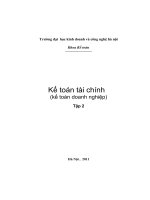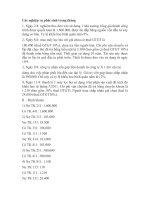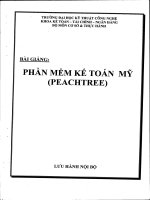Kế toán Mỹ Bài tập mẫu về Account Receivable and Bad Dept
Bạn đang xem bản rút gọn của tài liệu. Xem và tải ngay bản đầy đủ của tài liệu tại đây (103.86 KB, 12 trang )
CHAPTER 13
Receivables
CONTENTS
Demonstration problem
13.1 Doubtful debts — net credit sales and ageing
methods
13.2 Discounting and default of a bill receivable
13.3 Ageing of accounts receivable and adjustment
of allowance
13.4 Disposal of accounts receivable
13.5 Monitoring cash collection
13.1
CHAPTER 13: RECEIVABLES
WILEY
Transactions affecting Bradford Ltd’s accounts receivable for the year ended 30 June are
presented below. On 1 July of the previous year, the commencing balance of the Allow-
ance for Doubtful Debts account was a credit of $1960.
Required:
A. Prepare journal entries for each of the transactions in general journal format.
B. Determine the balance in the Allowance for Doubtful Debts account after the
30 June adjustment.
C. Assume that, instead of basing the allowance on net credit sales, the allowance is
based on an ageing of accounts receivable and that $8110 of the accounts receivable
at 30 June were estimated to be uncollectable. Determine the adjustment necessary
to bring the allowance account to the desired balance.
(continued)
DEMONSTRATION PROBLEM
Aug.
Sept.
Oct.
Jan.
March
April
June
June
3
6
16
15
5
9
8
4
30
Wrote off the $700 account of Gum Ltd as uncollectable.
Received 50% of the $650 balance owed by J. Wiley and wrote off the
remainder as a bad debt.
Recorded the collection of $475 from G. Rhodes in full payment of her
account, which had been written off earlier as a bad debt.
Wrote off the accounts of Pauley Ltd, $1100, and R. Donley, $360, as
bad debts.
D. Martin issued a 90-day 10% promissory note for $5000 in
settlement of his account receivable.
Received $500 from E. Darkins in full payment of his account, which
had been written off earlier as a bad debt.
Received 25% of the $2800 owed by North Ltd and wrote off the
remainder as a bad debt.
Recorded an account receivable for dishonour of D. Martin’s
promissory note issued on 5 March.
Estimated bad debts expense for the year to be 1% of net credit sales
of $503 500.
13.2
CHAPTER 13: RECEIVABLES
WILEY
Solution to demonstration problem
A.
(continued)
BRADFORD LTD
General Journal
Aug. 3 Allowance for Doubtful Debts
Accounts Receivable—Gum Ltd
To write off uncollectable account.
700
700
Sept. 6 Cash at Bank
Allowance for Doubtful Debts
Accounts Receivable—J. Wiley
To record cash received and write off
the remainder.
325
325
650
Oct. 16 Accounts Receivable—G. Rhodes
Bad Debts Recovered
To record recovery of bad debt.
475
475
16 Cash at Bank
Accounts Receivable—G. Rhodes
Cash received from customer.
475
475
Jan. 15 Allowance for Doubtful Debts
Accounts Receivable—Pauley Ltd
Accounts Receivable—R. Donley
To write off bad debts.
1460
1100
360
Mar. 5 Bills Receivable
Accounts Receivable—D. Martin
Unearned Interest
To record receipt of 10%, 90-day
promissory note.
5 123.29
5 000.00
123.29
9 Accounts Receivable—E. Darkins
Bad Debts Recovered
To record recovery of bad debt.
500
500
9 Cash at Bank
Accounts Receivable—E. Darkins
Cash received from debtor.
500
500
April 8 Cash at Bank
Allowance for Doubtful Debts
Accounts Receivable—North Ltd
To record cash received and write off
the balance of account.
700
2100
2800
June 4 Accounts Receivable—D. Martin
Bills Receivable
To record dishonour of bills receivable.
5123.29
5123.29
4 Unearned Interest
Interest Revenue
To record interest revenue.
123.29
123.29
30 Bad Debts Expense
Allowance for Doubtful Debts
Balance-day adjustment for bad debts.
5035
5035
13.3
CHAPTER 13: RECEIVABLES
WILEY
B.
C.
Allowance for Doubtful Debts
3/8
6/9
15/1
8/4
30/6 Balance c/d
700
325
1 460
2100
2410
1/7
30/6
Balance
Adjusting entry
1 960
5 035
6 995 6 995
1/7 Balance b/d 2 410
Allowance for Doubtful Debts
3/8
6/9
15/1
8/4
30/6 Balance c/d
700
325
1 460
2100
8110
1/7
30/6
Balance
Adjusting entry
1 960
10 735
12 695 12 695
1/7 Balance b/d 8 110
13.4
CHAPTER 13: RECEIVABLES
WILEY
Theo Pty Ltd sells furniture on credit. The following information was extracted from the
accounting records at 30 June 2003:
In the past, bad debts expense for the year has been estimated at 2% of net credit sales.
However, Theo Pty Ltd would like to compare this method with an ageing of the
accounts receivable. The following additional information was obtained with respect to
the accounts receivable:
Required:
A. Prepare the journal entries to adjust the Allowance for Doubtful Debts at 30 June
2003 under:
1. the net credit sales method
2. the ageing of accounts receivable method.
B. Determine the balance in the Allowance for Doubtful Debts account under both
methods.
C. Assume that the allowance account had a debit balance of $680 at 30 June 2003.
Show the journal entries to record the allowance for doubtful debts at 30 June 2003
under:
1. the net credit sales method
2. the ageing of accounts receivable method.
D. Using the journal entries from requirement C, determine the balance in the allow-
ance account under both methods.
E. Explain, with reference to requirements B and D, why the two different methods
result in different balances.
A.
THEO PTY LTD
General Journal
2003
30 June
1. Bad Debts Expense 16 300
Allowance for Doubtful Debts 16 300
Allowance made on 2% of net credit sales
2. Bad Debts Expense 16 675
Allowance for Doubtful Debts 16 675
Allowance made on ageing of accounts receivable
(
continued
)
Credit sales (for year)
Credit sales returns and allowances (for year)
Accounts receivable (balance 30 June 2003)
Allowance for doubtful debts (balance 30 June 2003)
$890 000
75 000
270 000
1 250 (credit)
Balance
% estimated
uncollectable
Accounts not yet due
Accounts overdue: 10–30 days
31–60 days
61–120 days
121 days and over
$145 000
50 000
35 000
22 000
18 000
1
/
2
2
10
25
40
$270 000
Problem 13.1
Doubtful debts — net credit sales and ageing
methods
Solution
13.5
CHAPTER 13: RECEIVABLES
WILEY
B.
1.
2.
C.
2003
30 June
1. Bad Debts Expense 16 300
Allowance for Doubtful Debts 16 300
Allowance made on 2% of net credit sales
2. Bad Debts Expense 18 605
Allowance for Doubtful Debts 18 605
Allowance made on ageing of accounts receivable
D.
1.
2.
B.
The net credit sales method and the ageing of accounts receivable method both calcu-
late a different balance for the Allowance for Doubtful Debts. The net credit sales
method calculates the adjusting entry for Bad Debts Expense as a percentage of net
credit sales and ignores any balance that may exist in the allowance account. The
calculation forms the basis of the adjusting entry. The ageing of an accounts receivable
calculates a desired ending balance for the Allowance for Doubtful Debts. The adjusting
entry for Bad Debts Expense is calculated by working to adjust back to achieve the
desired ending balance.
Allowance for Doubtful Debts
30/6 Balance 1 250
30/6 Balance c/d 17 550 30/6 Adjusting 16 300
17 550 17 550
Balance b/d 17 550
Allowance for Doubtful Debts
30/6 Balance 1 250
30/6 Balance c/d 17 925 30/6 Adjusting 16 675
17 925 17 925
Balance b/d 17 925
Allowance for Doubtful Debts
30/6 Balance 680
30/6 Balance c/d 15 620 30/6 Adjusting 16 300
16 300 16 300
Balance b/d 15 620
Allowance for Doubtful Debts
30/6 Balance 680
30/6 Balance c/d 17 925 30/6 Adjusting 18 605
18 605 18 605
Balance b/d 17 925
13.6
CHAPTER 13: RECEIVABLES
WILEY
Nehru Imports entered into the following transactions during the year ending
31 December 2002:
Required:
A. Prepare journal entries to record the transactions on Nehru Imports’ accounts.
B. Prepare journal entries to record the collection of the T. Williams bill.
Jan
March
April
May
Nov.
Dec.
6
7
6
6
16
31
Received a 10%, 90-day, $2000 bill in exchange for the overdue
account receivable of J. Davies.
The bill received from J. Davies was discounted at the bank at a
discount rate of 12%.
J. Davies defaulted on her bill and the bank assessed a protest fee of
$28. Nehru Imports paid the maturity value of the bill, plus the protest
fee.
J. Davies paid the maturity value of her dishonoured bill, plus the
protest fee and interest at 10% on both for 30 days beyond the bill’s
maturity date.
Received an $8400, 90-day, 12% bill from T. Williams in settlement of
his account receivable.
Interest was accrued on the bill receivable from T. Williams.
Problem 13.2
Discounting and default of a bill receivable
13.7
CHAPTER 13: RECEIVABLES
WILEY
A.
NEHRU IMPORTS
General Journal
2002
Jan 6 Bills Receivable 2 049.32
Accounts Receivable - J. Davies 2 000.00
Unearned Interest 49.32
($2 000 x 0.10 x 90/365)
To record receipt of bill from Davies.
Mar. 7 Cash at Bank 2 029.11*
Unearned Interest 20.21
Bills Receivable 2 049.32
($2 049.32 x 0.12 x 30/365)
Discounted Davies’ bill.
7 Unearned Interest 29.11
Interest Revenue 29.11
To record interest revenue.
*Maturity value $2 049.32
Discount ($2 049.32 x 0.12 x 30/365) 20.21
Proceeds $2 029.11
April 6 Accounts Receivable - J. Davies 2 077.32
Cash at Bank ($2 049.32 + $28) 2 077.32
To record dishonoured bill.
May 6 Cash at Bank 2 094.39
Accounts Receivable - T. Williams 2 077.32
Interest Revenue 17.07
($2 077.32 x 0.10 x 30/365)
To record cash received from Davies.
Nov 16 Bills Receivable 8 648.55
Accounts Receivable - T. Williams 8 400.00
Unearned Interest 248.55
($8 400 x 0.12 x 90/365)
To record bill from Williams.
Dec. 31 Unearned Interest 124.27
Interest Revenue 124.27
($8 400 x 0.12 x 45/365)
To record interest revenue.
B.
Feb. 14 Cash at Bank 8 648.55
Bills Receivable 8 648.55
To record collection of bill.
Feb. 14 Unearned Interest 124.27
Interest Revenue 124.27
($8 400 x 0.12 x 45/365)
To record interest revenue.
Solution
13.8
CHAPTER 13: RECEIVABLES
WILEY
Blue Jeans Ltd analysed its accounts receivable balances at 30 June 2002 and arrived at
the aged analysis below. The percentages of each age group that have proven uncollect-
able in the past are shown next to the aged balances.
The company uses the allowance method to account for bad debts. On 30 June 2002 the
credit balance of the Allowance for Doubtful Debts account is $1800 before any
adjustments.
Required:
A. Prepare the adjusting entry for estimated bad debts on 30 June 2002.
B. Give the entry to write off the account of G. Bie in October 2002, $1002.
A.
BLUE JEANS LTD
2002
June 30 Bad Debts Expense 18 840
Allowance for Doubtful Debts 18 840
To record allowance for doubtful debts.
$210 000
×
.5% $10 500
60 000
×
2.5% 1 500
15 000
×
10% 1 500
18 000
×
13% 2 340
12 000
×
40% 4 800
$20 640
Less: Balance 1 800
$18 840
B.
2002
Oct Allowance for Doubtful Debts 1 000
Accounts Receivable – G.Bie 1 000
To write off G.Bie account.
Age
Estimated
uncollectable (%) Balance
Current
30–60 days past due
61–120 days past due
121 days to 6 months past due date
Over 6 months past due
0.5
2.5
10
13
40
$210 000
60 000
15 000
18 000
12 000
$315 000
Problem 13.3
Ageing of accounts receivable and adjustment of
allowance
Solution
13.9
CHAPTER 13: RECEIVABLES
WILEY
The following transactions were entered into by Maryborough Hardware Ltd:
Required:
Record the above transactions in the general journal of Maryborough Hardware Ltd.
MARYBOROUGH HARDWARE LTD
Oct. 1 Cash at Bank 80 000
Loan Payable 80 000
To record loan from Regal Finance Ltd.
Receivables Assigned as Loan Security 80 000
Accounts Receivable 80 000
To assign receivables to Regal Finance Ltd.
Service Fee Expense 2 400
Cash at Bank 2 400
To pay service fee.
22 Cash at Bank 38 000
Receivables Assigned as Security 38 000
To record cash from assigned receivables.
31 Loan Payable 38 000
Interest Expense 550
Cash at Bank 38 550
To pay cash from receivables and interest.
Nov. 15 Cash at Bank 30 500
Receivables Assigned as Security 30 500
To record cash from assigned receivables.
Loan Payable 30 500
Cash at Bank 30 500
To pay cash from receivables.
28 Loan Payable 11 500
Interest Expense 400
Cash at Bank 11 900
To pay remainder of loan plus interest.
30 Accounts Receivable 11 500
Receivables Assigned as Security 11 500
To reassign receivables to normal conditions.
(
continued
)
Oct.
Nov.
1
22
31
18
28
30
Borrowed $75 000 from Custom Finance Ltd. As security for this debt,
Maryborough Hardware Ltd assigned $80 000 of its accounts
receivable to Regal Finance Ltd, the finance company charging a
service fee of 3% of the receivables assigned.
Cash collected from the receivables assigned on 1 October amounted
to $38 000.
Cash collected from the assigned receivables by Maryborough
Hardware Ltd was forwarded to Custom Finance Ltd, together with
interest on the loan of $550.
Additional cash collected by Maryborough Hardware Ltd from the
assigned accounts receivable amounted to $30 500. This was
forwarded to Custom Finance Ltd.
The loan was paid out in full by Maryborough Hardware Ltd. This
included a further interest cost of $400.
Outstanding amounts on the assigned accounts receivable were
returned to the ledgers of Maryborough Hardware Ltd.
Problem 13.4
Disposal of accounts receivable
Solution
13.10
CHAPTER 13: RECEIVABLES
WILEY
Alternative solution
The above solution assumes that the receivables asset is still recorded in the books of
Maryborough Hardware Ltd, and is held in the form of a “sinking fund” against the loan
payable. The alternative solution below assumes that the receivables assets are disposed
of to Regal Finance Ltd.
Oct. 1 Cash at Bank 80 000
Accounts Receivable 80 000
To record receivables disposed of to Regal Finance Ltd.
Service Fee Expense 2 400
Cash at Bank 2 400
To record service fee paid.
22 Cash at Bank 38 000
Regal Finance Ltd 38 000
To record cash from receivables, payable to Regal Finance Ltd.
31 Regal Finance Ltd 38 000
Interest Expense 550
Cash at Bank 38 550
To record amount paid to Regal Finance Ltd.
Nov. 18 Cash at Bank 30 500
Regal Finance Ltd 30 500
To record cash from receivables, payable to Regal Finance Ltd
Regal Finance Ltd 30 500
Cash at Bank 30 500
To record amount paid to Regal Finance Ltd.
30 Accounts Receivable 11 500
Interest Expense 400
Custom Finance Ltd 11 900
To repurchase remaining receivables from Regal Finance Ltd.
30 Regal Finance Ltd 11 900
Cash at Bank 11 900
To pay for receivables and interest.
13.11
CHAPTER 13: RECEIVABLES
WILEY
Presented below is information extracted from the annual reports of Home Hill Ltd and
Reid River Traders:
Required:
A. Calculate the receivables turnover ratio and average collection period for both
companies. Comment on the difference in their collection experiences.
B. Compare the success or otherwise of their cash collection policies, given that the
average receivables turnover for the industry in which the companies operate is 8.
Credit terms for both companies are 2/10, n/30.
A.
HOME HILL LTD & REID RIVER TRADERS
Home Hill Ltd Reid River Traders
Sales (net credit) for year
Allowance for Doubtful Debts, 1/7/00
Allowance for Doubtful Debts, 30/6/01
Accounts receivable (gross) 1/7/00
Accounts receivable (gross) 30/6/01
$2 380 400
14 140
16 350
542 950
365 000
$1 740 725
22 425
23 200
276 500
288 650
Home Hill Ltd Reid River Traders
Receivables turnover ratio:
Net credit sales revenue
Average receivables
$2 380 400
($542 950
+
$365 000)/2
=
5.2 times
$1 740 725
($276 500
+
$288 650)/2
=
6.2 times
Average collection period:
365 days
Receivables turnover ratio
365 day
s
5.2
=
70 days
365 day
s
6.2
=
59 days
Problem 13.5
Monitoring cash collection
Solution







